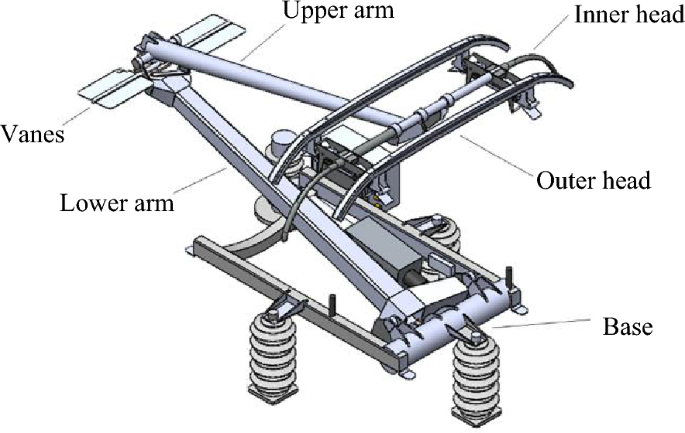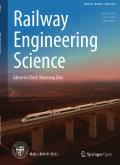结合数值分析的动态受电弓载荷建模
IF 5.4
1区 工程技术
Q2 TRANSPORTATION SCIENCE & TECHNOLOGY
引用次数: 0
摘要
摘要受电弓与接触网的适当相互作用是保证列车平稳运行的必要条件。改变架空线路的高度,以适应平交道口、天桥和隧道,这对保持一致的电流收集性能构成了重大挑战,因为受电弓的空气动力学外形,因此空气动力学载荷随着运行高度的变化而显著变化。本研究旨在分析HSX受电弓各部件在不同配置和方向下的整体流动特性和气动力,以便将研究结果与多体仿真相结合,获得准确的接触力动态信息。具体来说,计算流体动力学模拟用于研究受电弓组件在代表性设置中的载荷,例如800级列车上的凹腔。从气动角度来看,本研究表明,受电弓非固定部件所受的总阻力,在受电弓前伸方向比后伸方向更大,但两者之间的差异随着受电弓延伸的增加而减小。将作用于单个组件的气动载荷与多体工具相结合,可以对受电弓的行为进行真实的动态洞察。得到的结果表明,考虑气动力如何增强模型的真实性,导致受电弓接触网接触力的行为与实验测试中看到的密切匹配。本文章由计算机程序翻译,如有差异,请以英文原文为准。

Modelling dynamic pantograph loads with combined numerical analysis
Abstract Appropriate interaction between pantograph and catenary is imperative for smooth operation of electric trains. Changing heights of overhead lines to accommodate level crossings, overbridges, and tunnels pose significant challenges in maintaining consistent current collection performance as the pantograph aerodynamic profile, and thus aerodynamic load changes significantly with operational height. This research aims to analyse the global flow characteristics and aerodynamic forces acting on individual components of an HSX pantograph operating in different configurations and orientations, such that the results can be combined with multibody simulations to obtain accurate dynamic insight into contact forces. Specifically, computational fluid dynamics simulations are used to investigate the pantograph component loads in a representative setting, such as that of the recessed cavity on a Class 800 train. From an aerodynamic perspective, this study indicates that the total drag force acting on non-fixed components of the pantograph is larger for the knuckle-leading orientation rather than the knuckle-trailing, although the difference between the two is found to reduce with increasing pantograph extension. Combining the aerodynamic loads acting on individual components with multibody tools allows for realistic dynamic insight into the pantograph behaviour. The results obtained show how considering aerodynamic forces enhance the realism of the models, leading to behaviour of the pantograph–catenary contact forces closely matching that seen in experimental tests.
求助全文
通过发布文献求助,成功后即可免费获取论文全文。
去求助
来源期刊

Railway Engineering Science
TRANSPORTATION SCIENCE & TECHNOLOGY-
CiteScore
10.80
自引率
7.90%
发文量
1061
审稿时长
15 weeks
期刊介绍:
Railway Engineering Science is an international, peer-reviewed, and free open-access journal that publishes original research articles and comprehensive reviews related to fundamental engineering science and emerging technologies in rail transit systems, focusing on the cutting-edge research in high-speed railway, heavy-haul railway, urban rail transit, maglev system, hyperloop transportation, etc. The main goal of the journal is to maintain high quality of publications, serving as a medium for railway academia and industry to exchange new ideas and share the latest achievements in scientific research, technical innovation and industrial development in railway science and engineering. The topics include but are not limited to Design theory and construction technology System dynamics and safetyElectrification, signaling and communicationOperation and maintenanceSystem health monitoring and reliability Environmental impact and sustainabilityCutting-edge technologiesThe publication costs for Railway Engineering Science are fully covered by Southwest Jiaotong University so authors do not need to pay any article-processing charges.
 求助内容:
求助内容: 应助结果提醒方式:
应助结果提醒方式:


